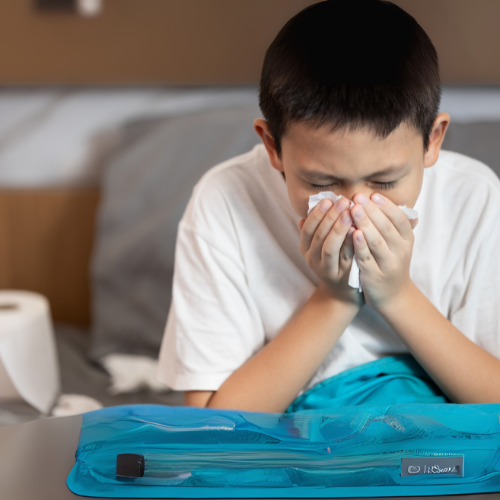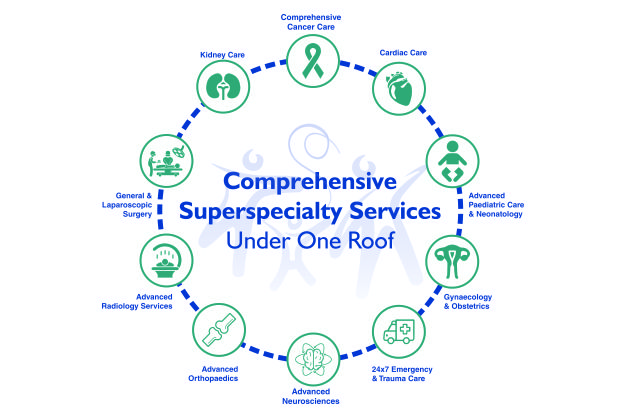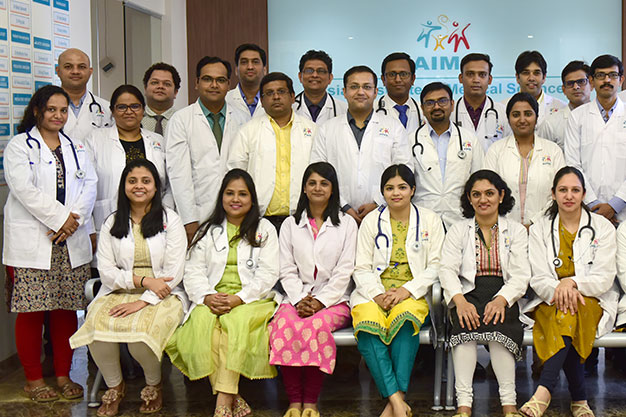
DATE : 26/11/2024
AUTHOR : AIMS Hospital
The problem of childhood allergies is becoming an everyday challenge for millions of children as it is causing allergies to grow in children. These allergies may stem from particular foods or environmental factors such as pollen, dust mites, and animal dander. Allergies can result in discomfort or can result in health complications if medical assistance is not sought out. For many parents, the management of these allergies is hard, particularly if the triggers cannot be specifically pinpointed. In such scenarios, this is where allergy testing becomes critical. Performed with the direction of trained professionals, testing for allergies assists in locating the exact triggers enabling parents, guardians and doctors to manage and improve the child’s overall quality of life.
Allergic Reactions in Children- Allergy Testing for Diagnostic Purposes
Allergies are capable of disrupting a child’s everyday activities such as sleep, focus, and in more severe cases, development. Allergies can, in some instances lead to anaphylactic shock and other forms of life-threatening emergencies. The early identification of allergens through allergy testing helps parents to be aware and avoid exposure thus minimizing the chances of severe reactions. More so knowing the allergy that causes them problems allows parents to make choices concerning their child’s diet, activities, and surroundings which allows them to be healthier and comfortable.
Common Allergens in Children
A wide range of allergens can cause allergies in children. Some of the most common allergens include the following:
1. Food Allergens: Food items such as peanuts, tree nuts, milk, eggs, wheat, soy, fish, and shellfish may cause allergies in many children. Food allergies can be particularly severe and sometimes result in anaphylaxis or anaphylactic shock.
2. Allergens: Tree, grass or weed pollen, dust mites, mold or pet dander are allergies which can cause respiratory illness or skin reactions in children.
3. Insect Stings and Bites: Some children may develop life-threatening allergies due to wasp or bee stings and these children should seek medical attention without delay.
4. Medications: Certain medications can cause allergy reactions in children. Certain antibiotics such as penicillin are common provocateurs and can be tested for via urine allergy testing.
5. Latex: With age some children can develop an allergy to different latex items found in household objects and some medical equipment.
Parents can then take steps to supplement these practices in order to minimize the chances of exposure to allergens.
Benefits of Allergy Testing for Children
1. Handling Allergens in Advance: Early allergen detection allows healthcare providers to devise an appropriate management plan, which in some cases is a therapeutic approach or lifestyle alteration including a vacillating degree of immunotherapy that will help decrease the sensitivity towards the defining allergens over time.
2. Living with No Limits: Knowledge of the specific allergens facilitates children to know the areas that they ought to avoid with regard to participation in activities that may elicit a reaction from an allergen. This way, the children are able to live fully, making sure that their allergies do not have an adverse effect in their social and school life.
3. Education and Self-Management: Knowledge gained from allergy testing is important in providing both parents and children with information on the specific triggers. This way gradually, the children learn on how they can avoid the allergens and, as they grow, they will build the capabilities of being able to deal with issues of their health on their own.
4. Avoidance of Underlying Infections: Allergies if not treated can lead to the emergence of advanced conditions like asthma, eczema, chronic sinusitis among others. The emphasis on early allergy testing is meant to promote prevention of these complications. This will be achieved by making sure that triggers are easily identified and avoided before long term effects on the respiratory system occur.
5. Food Instructions: Children who are suffering from food allergies may find it difficult to give balanced nutritional intake. By identifying specific food allergens, parents can work with healthcare providers and nutritionists to find safe, nutritious alternatives that promote growth and development.
When to Consider Allergy Testing for your Child
Allergy tests are not a crucial process without a good reason. Here are signs which may suggest that it is necessary for your child to undergo allergy tests:
- Constant Symptoms: If your child suffers from these symptoms on a recurrent basis such as redness of the eyes, relentless sneezing, or skin eruptions, a child allergy test would help in determining what the allergens responsible for such symptoms are.
- Genetic Transmission of Allergy: There is a tendency for certain kinds of allergies to be present in blood relatives and if others in the lineage of the child have any form of allergy, chances are that the child will also suffer from one type or the other.
- Sudden Seemingly Illogical Reactions: Is your child exhibiting signs such as swelling for no apparent reason? This is also true if they are finding it increasingly difficult to breathe, then you must perform allergy tests on them to find out what allergens they are introducing to their body.
- Symptoms that follow a Pattern: Those phenomena maybe pollen induced and once the child undergoes an allergy test it will easy to determine conclusively what kind of allergy they have.
Types of Allergy Tests Available for Children
Allergy can be basically diagnosed in a number of ways and the health practitioner performing the procedures will decide the most suitable method according to the child’s age, medical past and ailments they present with:
- Skin Prick Test: Small amounts of allergens are applied to the skin using tiny pricks and if a child is allergic a small reaction such as redness or swelling is noted. This procedure has proven to be simple, rapid and effective in diagnosing several allergies at once.
- Blood Tests: In situations that preclude the adoption of procedures involving skin tests, a blood test can be used to measure the immune system’s response to allergens.
- Oral Food Challenge: Under controlled conditions, the child is gradually exposed to a suspected food allergen to monitor for any reactions.
Conclusion
Allergy testing is a valuable tool for parents seeking to understand and manage their child’s allergies. By identifying specific triggers early on, families can improve their child’s quality of life, prevent severe reactions, and foster a proactive approach to health management. For professional allergy testing and compassionate care, AIMS Hospital offers a comprehensive range of pediatric allergy services. Our specialists, including Dr. Bobby Sadawarti, are dedicated to helping children lead healthier lives free from the constraints of unmanaged allergies.
ABOUT US
About AIMSDirector's Message
Vision & Mission
Accreditations
Awards & Accolades
Our Network
Phone Directory
Designed by Web Creations 2022. All rights reserved.










